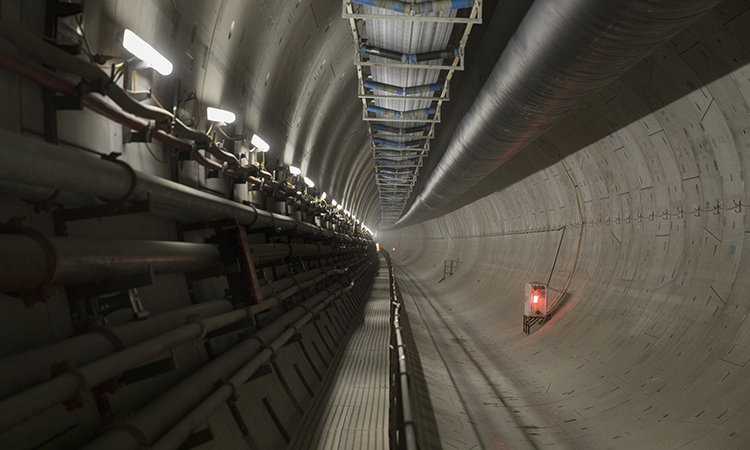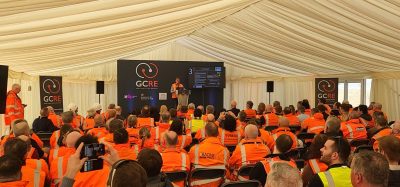Video: HS2 tunnelling in London reaches first milestone
Posted: 31 July 2023 | Elliot Robinson (Editorial Assistant - Global Railway Review) | No comments yet
Two HS2 Tunnel Boring Machines have completed the first mile of a twin-bored tunnel in London.


Credit: HS2
HS2’s first two Tunnel Boring Machines (TBM) in London have completed the first mile of twin-bored tunnel in the capital. Since launch in November 2022, the 2,000-tonne TBMs have both installed over 847 tunnel rings each, made up of 5,929 concrete segments.
The first tunnel being constructed is the “downline” and will be where trains travelling south towards London will run once Britain’s new high speed rail line is operational. The second being constructed is the “upline”, where trains will travel to the Midlands and North. In total, the twin-bored Northolt Tunnel will be 8.4 miles long and is expected to be complete by 2025.
Over 240,000 m3 of mixed soil (London Clay, chalk and sand) has been extracted during the tunnelling process so far and is being used north of the tunnel to create new wildlife habitat and landscaping. The earth is kept within the HS2 site boundaries.
“As the construction of HS2 continues to develop at pace, we edge closer to the benefits of this transformational railway coming to life,” Huw Merriman, Rail Minister, said. “While its construction protects natural habitats and creates thousands of jobs, its completion will soon connect our largest cities and create quick, sustainable rail journeys that are fit for the future.”
“Work to build the HS2 network in London is gaining momentum and completing one mile of twin bored tunnel is another sign of progress on delivering the HS2 route between London and Birmingham,” Malcolm Codling, Project Client for HS2, said. “HS2 will deliver zero-carbon journeys from day one, linking the major cities of the Midlands and North with London and releasing train path capacity for local, regional and freight services.”
A team of 17 tunnel engineers from HS2’s Main Works Civils Contractor, Skanska Costain STRABAG joint venture (SCS JV), has been operating each TBM, working closely with a 60 strong team on the ground. The 58,000 tunnel segments for this section of the London tunnels are being manufactured by Pacadar on the Isle of Grain in Kent. Recently the delivery of the segments has been by rail to the sidings at the West Ruislip site, reducing lorry journeys on roads.
“Completing our first mile of tunnelling on both of our TBMs is a fantastic moment for the HS2 London tunnels programme, early next year our next two TBMs will be launched from Victoria Road crossover box, close to Old Oak Common station,” James Richardson, Managing Director of Skanska Costain STRABAG JV, said. “All these drives will then meet at Greenpark Way in Greenford, forming the route for the initial opening of HS2 into London. The HS2 London Tunnels team is undertaking some of the most complex tunnelling operations ever embarked on and this milestone has been achieved through a combined effort of all parts of the team. Shafts along the route are all now reaching completion of the civil engineering works in preparedness for the TBMs to pass underneath. We’ve also embarked on one of the largest utility projects to enable to tunnels to safely pass through this year.”
The SCS JV team are now preparing to begin the construction of cross passages between the two tunnels. The link between the two parallel tunnels will be used in emergencies.
The TBMs are due to reach the first ventilation and emergency access shaft at South Ruislip in Autumn 2023, after they have travelled a distance 1.7 miles. The shaft is 35 metres deep and a ‘headhouse’ will be built above it to house safety equipment. The building will have a green roof and will be constructed using timber and brick, sympathetic to the local landscape.
The 8.4-mile Northolt Tunnel will be completed with two additional TBMs which will be launched from the opposite end of the tunnel at Victoria Road Crossover Box in Ealing next winter. All four TBMs constructing the tunnel will end their journeys at Greenpark Way in Greenford in Ealing where they will be extracted from the ground.
Related content you enjoy:
Video: HS2 complete western portal of the Copthall Green Tunnel
HS2 trials automotive technology to drive down embedded carbon by 10%







